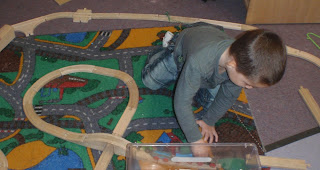Part 1) Spotting and Identifing 10 Common Schemas - the objective here was to introduce staff to 10 different schemas that were easily recognisable and ones that were more likely to be seen over and over again in children's play both in the settings and at home.
These 10 schemas have been listed below in earlier posts.
In participating in this training it was hoped that staff would be in a better position to recognise such patterns of behaviour. In turn this would enable them to identify the play patterns of their key children and enhance provision. As it was; during the training session, many staff were able to recognise these characteristics in many children they were currently working with. A high number of staff were therefore stepping on board and begining to understand the significance in adopting a schema approach that enabled them to identify children's 'true interests' and to plan for children's learning and development through possible lines of direction.
All staff recieved a 'Spotting and Identifying Schema Booklet' to use in their daily work.
| This young boy has been recognised as having a connection schema |
 |
| This child plays in the centre of the train track (Enclosure) |
Staff were made aware of the importance of adding these interests to either a child's exisisting PLOD or if the interest (in writing own name) was so dominant; this might even warrant a PLOD of its own. A new PLOD could then be placed over the top of the current PLOD. (It may be needed again in a week or two if the child's interest changes back!)
Let's say, for example, a child visits Dungeness over the weekend with their family and develops a fascination in lighthouses. The child arrives at nursery on Monday and talks about it continuously. The interest in the lighthouse leads to discussions of the sea and before you know it you observe the child building lighthouses from junk material or blocks and painting lighthouses.
This is not a schema? So what do you do in this instance?
No, it's not a schema BUT it is an interest (which is all a schema is) and of course staff will still need to plan for this interest. They could plan some adult-led activities or even a mini project (there are bound to be many others interested in lighthouses and the sea?) After all, the project would still be child-initiated; NOT adult-initiated and this is therefore acceptable.
 |
| This two year old enjoys a safe place to climb 'on top' |
Many staff who were previously sceptical about schemas in children's play had changed their thinking since the training and were able to recognise some aspects of behaviour in the children they were currently working with and even in their own children!. A huge majority were also keen to get back to their setting to spot and identify schematic play and to make observations. A case study assignment was set for all staff to identify one child's schema, produce a PLOD for the child, and then a written report (in a learning story). And all within a certain deadline.
Staff rose to the challenge... (Next Blog)
The return was MASSIVE!!!!
Well Done Everyone! This is all positive stuff!
No comments:
Post a Comment